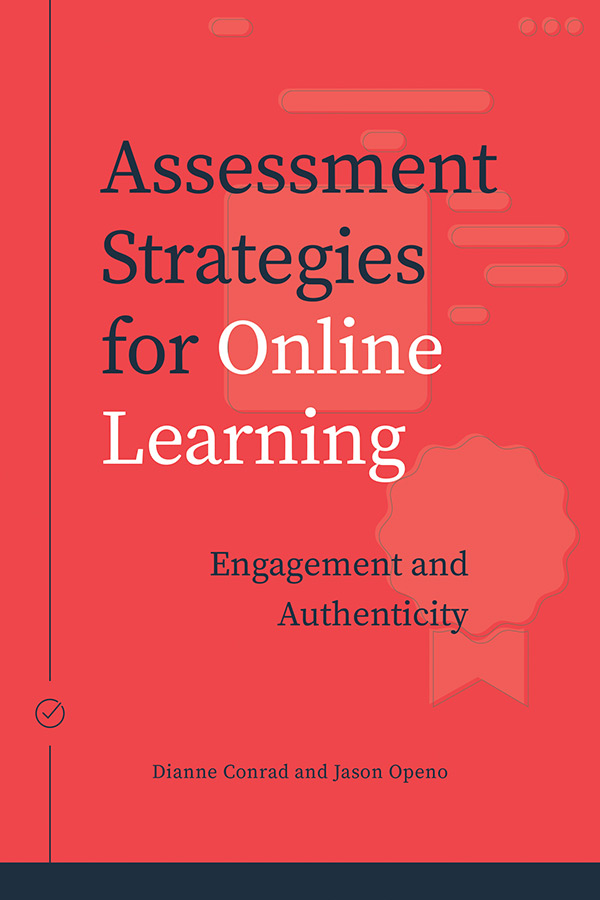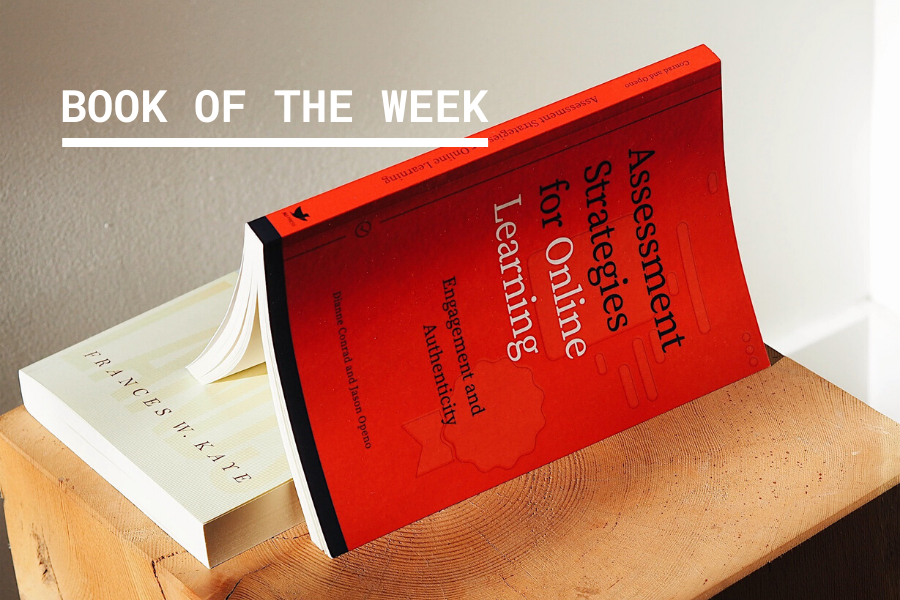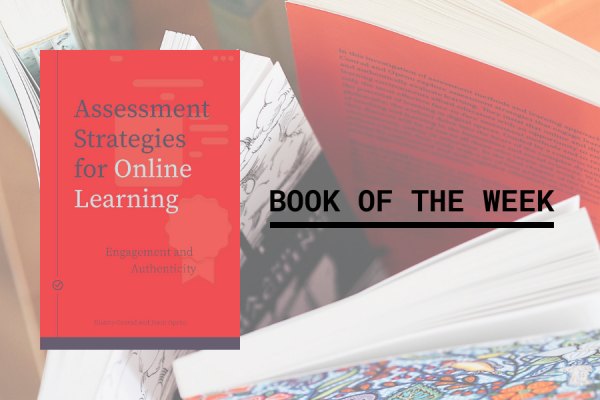by Jason A. Openo
Assessment Strategies for Online Learning: Engagement and Authenticity by Dianne Conrad and Jason Openo is our #AUPBookOfTheWeek. This article, by one of the co-authors, originally appeared in the Journal for Research Practice in College Teaching, Special Issue: Innovative Teaching Personal Essays 3, no. 2 (2018).
To put it plainly, assessment sucks. In my ten plus years in postsecondary as both a faculty member and a director of a teaching and learning center, no colleague has ever expressed joy for marking or grading. When I consult with faculty, I love to ask, “What gets you excited about teaching?” No one has ever replied, “Building meaningful assessments for my students.” The best I have heard is that grading is a “necessary evil,” and there is something pernicious about it.
Ever since 1792, when an obscure chemistry tutor at Cambridge named William Farish decided to assign a numerical value to student work (Postman, 1993), this peculiar practice of reducing student learning and performance to a letter or number has locked in and locked out. Grades effect program entrance requirements, course transferability, and grade distribution is accepted as a proxy for quality and academic rigor. Frequent complaints include that assessing student learning is time-consuming and subjective; learning outcomes and rubrics are reductive, and well documented flaws of the system, such as grade inflation, seem irredeemable. As long as grades exist, I fear students will always focus more on the letter rather than the learning. I don’t think Farish’s approach is anywhere close to the best system we could build, but it is regrettably a system that has locked in. That belief is at the root of how I became, over the years, a minor expert in assessment, and I am using expert in the way Heisenberg did – as someone who has made big mistakes and now knows how to avoid them.
I will never forget my first course, which finished in a trough of disappointment. “I worked so hard this semester. I gave you everything I had, and this is what you turn in?” As I stared at the last slog of term papers and final exams and thought about teaching again next semester, I said to myself, “Never again.” I was either going to quit teaching or I was going to make this process mean something to me. My interest in creating engaging and meaningful assessments did not start with students, it arose from my desire to stop the stultifying process of inviting meaningless student work (that I had assigned!). I was, after all, ultimately responsible for doing this to them and to me.
Authentic assessments are ill-defined and open-ended tasks that provide opportunities for students to apply their learning on real-world problems relevant in their discipline (Conrad & Openo, 2018). Students work collaboratively and practice communication, problem solving, self- management and teamwork in mastering course content. I didn’t know about authentic assessments when I first started instructing, but that’s the direction I headed in instinctually.
First, I incorporated online discussions. It was authentic insofar as it encouraged students to bring their whole selves to the learning, but the discussions often lacked context and purpose. Still, it was an important addition because the occasionally large international student base felt more comfortable writing than speaking. Through discussion, I gained insights into my students’ thought processes I would have never gotten otherwise, and so did the whole community.
Then I moved towards open book exams, which was disciplinarily relevant. I teach in library and information science, where students develop sophisticated search skills using a variety of resources. Asking them to rely solely on their memory contradicted the discipline, and I was more interested in their personal synthesis than their memory. This too, had a marginally beneficial impact. Asking students for their personal thoughts on core course content and giving them time to come up with answers reduced the inclination for cheating at the same time it made exams and papers more interesting to read.
The big breakthrough came a couple of years in when I decided to make the assessment mirror my “real world” as much as possible. At the time, I was chairing a team for a large library system trying to come to terms with the disruptive innovation of the Internet on reference services. They needed to envision a new future for information services that combatted the discourse of obsolescence affecting libraries. I decided to ask my students to do the same thing, and I began to think of myself as the students’ manager, not their teacher. Much of my work in supporting the digital shift in libraries had relied on strategy work completed in small teams using email, collaborative documents, and then presenting thoughts and recommendations to senior executives in order to justify new resource allocations and transform customer service. Mirroring that, I broke the students into teams and scheduled bi-weekly update meetings. This shift also enabled me to better teach the essence of the course – leadership and management.
I struggle to teach leadership because I cannot teach anyone how to be leader. I am not even comfortable trying to define leadership, but I do believe being a leader or a manager is personal, relational, and directional. By designing an assessment where students needed to work together in a team forced them into relationship to think about how social and technological directions were going to affect libraries, archives, and museums, and apply critical thinking to determine what these organizations needed to do to adapt. The added benefit was that this new student assignment allowed me to learn from my students’ passions, from Indigenization to Blockchain, to become a better practicing library leader.
My favorite assignment, however, is the traditional personally reflective essay. The essay asks students to select a leadership theory they feel closely aligns with their personal conception of leadership, present and critique this leadership theory, and then explain what concrete actions they will take to self-develop as leaders. This last part of the essay is authentic because every year, I need to complete and submit a professional development plan detailing how I am going to grow as a professional. I find this annual reflection on growth personally fulfilling, and I am asking them to do the same thing.
Unsolicited emails from students, the vibrancy of that week’s online discussion, and the final student course reflections convinced me that students found this assignment personally meaningful. For me, 16 out of the 54 essays were “a pleasure to read” (an important part of what an A+ looks like in my rubric), and so I didn’t mind being up past midnight two weeks in row in order to get their essays back to them in a timely manner.
Recently, I co-authored Assessment Strategies for Online Learning: Engagement and Authenticity (Conrad & Openo, 2018). The book release signifies that I am no longer that young instructor experiencing the assessment blues and experimenting with ideas ungrounded in learning science. Now, I am a seasoned professional with some teaching expertise. This maturation of becoming someone who has “written the book” on one of the great mysteries of teaching and learning confers an obligation to practice what I preach, and what I preach is that pedagogical innovation starts and ends with creating authentic assessments to engage students. To sustain the innovation, future iterations of my assessments will be improved by student feedback and informed by my daily life. I begin and end with assessment, and I am looking forward to making refinements because grading is no longer the soul-sucking activity it used to be.
References
Conrad, D., & Openo, J. (2018). Assessment strategies for online learning: Engagement and authenticity. Edmonton, AB: Athabasca University Press.
Postman, N. (1993). Technopoly: The surrender of culture to technology. New York, NY: Vintage Books.

You can download Assessment Strategies for Online Learning for free on our website.


